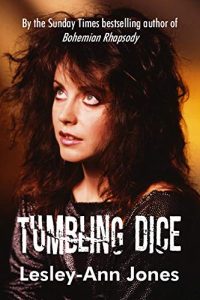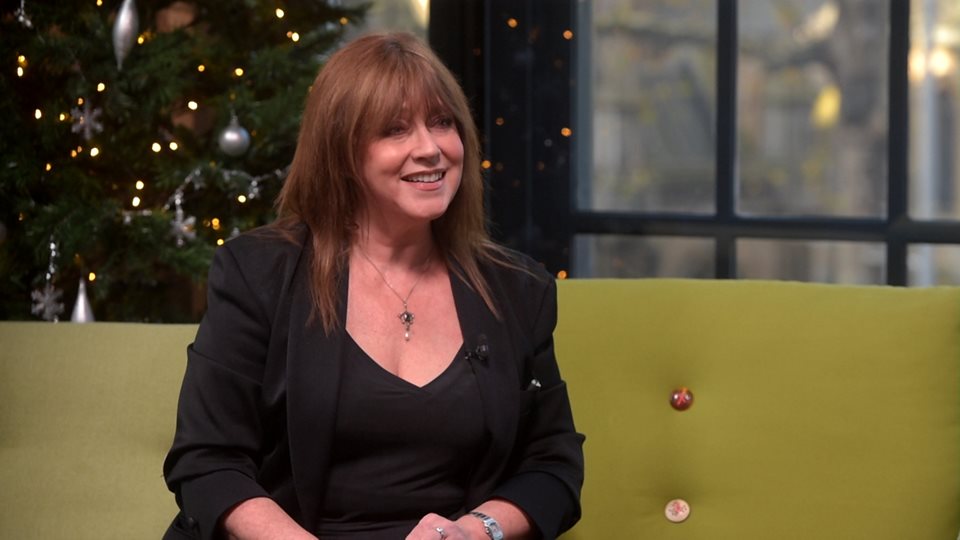Lesley-Ann Jones is an author who worked for the likes of the News of the World back in the 80s and 90s. She was whisked around the world to interview people like Hugh Grant (post-Divine and very funny story), Madonna, Raquel Welch, Freddie Mercury and Marco Piero White. Now she’s re-lived it all in her new memoir, Tumbling Dice, which really brings it all back. It’s a fascinating read.
What prompted you to write a memoir now?
I had dined out for years on many hair-raising Fleet Street war stories. At one point, I might have mistaken the phrase ‘Tell me again the one about …’ for my name. I’d lost count of the number of people who had said to me, ‘You really should write a book about your own life.’ So I had been thinking about it for a long time, while never actually doing anything about it. Then my youngest child came of age, while my parents are now in their eighties. It occurred to me that it would be nice to publish such a book while they are still alive, and also that I wouldn’t have to hold back anymore because my children are now grown-ups and could take it. Once I started, it just poured out. It was a very cathartic experience. I hadn’t realized how damaged I was by certain episodes: we tend to bury things, and to live in denial. Writing about them forced me to confront my feelings about them in a different way. On the whole, I have to say, this was a good thing.

You have described the experience as like going out nude? Could you elaborate upon that?
I was staying at the Sunset Marquis in West Hollywood some years ago with my eldest daughter when an earthquake occurred. Quite a serious earthquake: 7.9 on the Richter scale. The bed I was in at the time ended up across the room, underneath the television, a vast thing, which was now dangling precariously from the wall. Ours was a poolside room on the ground floor, with the main door leading out to the swimming pool terrace. I looked outside and saw a naked woman running along the other side of the pool, screaming. She was completely starkers, except for a very elaborate diamond necklace and chandelier earrings. I remember thinking, not even in the most severe earthquake would I go legging it outside without my clothes on. Daft, really, when you think about the difference between bare-bum nakedness and being bikini-clad, which is a few skimpy triangles and some bits of string. Not that you’d catch me wearing one of those these days, either. But you get my drift. I’ve had three kids. The body is not what it was. I wouldn’t want to frighten the animals. In other words, I am extremely shy and self-contained, like most people. Writing a memoir is the most self-exposing thing that a writer can do, and yes, it is very frightening. What on earth will people think?
Philip Norman describes you as ‘naughty’ in the foreword? Why does he think that?
I have always been a wicked type. Always up for mischief. Given to double-entendres and pranks, with a taste for shaking things up. Life is much more interesting when it has a big tee-hee factor. I was involved in a lot of end-of-pier-type escapades on Fleet Street in the name of a good story. I’ve got some cheek, too. I tend to say the unsayable. I get away with it. I think Phil was alluding to that.
You seem to me to travel between prim and on the nose?
It’s an accurate assessment. I can’t explain it. My eccentric Welsh upbringing, probably. My great-grandmother, grandmother and elderly aunts were all unbendingly proper and obsessed with keeping up appearances. They wouldn’t even nip down the shops without reaching for hat and gloves. But they all knew how to let their hair down and have a rollicking good time over a tipple behind closed doors. I have vivid memories of them all hitching up their skirts and dancing. I must take after them.
This is a memoir that is mainly about the 80s and 90s, you say there was more drugs and alcohol in TV than the music biz?
That was certainly my experience. Drug taking at Chrysalis Records, where I worked, just wasn’t a thing. We drank our share of champagne, though. It was enough. I have never ‘done drugs’. I’ve never even had a drag on a cigarette. I have only wet vices.
You do have a few demons to face down in this book, was it cathartic in that way, or just painful?
Both. Now that I’ve done it, I have a taste for it. There is much more to say. I am already working on the sequel.
You really have hung out with a lot of musicians, actors including unlikely ones like Raquel Welch and Gary Glitter? Accessibility was just so different in those days, wasn’t it?
A number of full-blown careers that we nowadays take for granted simply didn’t exist back then. I’m talking personal managers and publicists, agents and PRs… and a lot of hangers-on. Most artists didn’t have such people in their lives, all justifying their own positions and jobs by interfering and coming between journalist and star. If we bagged an interview with a celebrity, it was just us and them, in a room or a restaurant for a couple of hours. If you hit it off and got on, they might ask you what you were doing for dinner that night. The following week, you might get a call asking you to go to Dusseldorf with them, to review a show. You’d be picked up by their limo, you’d sit next to them on the plane, stay in the same hotel, and be treated like one of their entourage. There was no ‘us and them’ about it. The unspoken rules were simple: you wrote the interview. You reviewed the gig. Whatever else you might witness, it was a case of, what happens on the road stays on the road. You didn’t write the off-record stuff, or you would never be invited back. That was the code by which journalists and artists lived. That code was broken during the early Nineties, when the age of the Paparazzi reached an all-time high – or should I say, ‘low’ – and when celebrity coverage became vicious, every-man-for-himself. Think back to how the rottweilers stalked Freddie Mercury during his final couple of years, photographing him as he left his doctor’s surgery, looking gaunt and on his last legs. They appeared to relish his demise, as if to say, look, this is what you get for being gay. It was shameless and appalling. Laws have changed since then, and rightly so. In our day it was mostly fun, light-hearted and good-humoured. But of course, the Pandora’s Box is open, now. there is no going back.
There are mentions re getting old and attitudes to it – Madonna, you describe, as in fear of it and in pursuit of youth, Joan Collins who also became a friend by the sound of it, is described as having ‘mock-croc’ skin on her body but the perfect face because she’s kept it out of the sun. What’s your personal take on getting older?
That it is better than the alternative. I have a circle of very close friends who are all considerably older than me. My best friend in the world, Simon Napier-Bell (the former manager of Wham!) is nearly three decades older than me, but we are virtually the same person. There is no ‘age gap’. Along with Simon, Ed Bicknell, the former manager of Dire Straits, Clem Cattini, the UK’s most prolific session drummer and former member of the Tornados, and Brian Bennett, the Shadows drummer, are my closest male friends. We make a formidable gang. My best female friend is a decade older than me. I’m still in close touch with three close classmates from school, and two from college … none of which proves anything, other than the fact that people are valuable throughout their lives, and that society places far too great an emphasis on ‘age’ and numbers. It’s not a qualification. I had grandparents and aunts who lived to great ages. I was accustomed to spending considerable time with much older people from a very young age. At my church, St. Bride’s, ‘the Journalists’ Church’ on Fleet Street, most of my friends there are in their 70s and 80s. But their ages are irrelevant. I wrote about Madonna’s hang-ups about growing older, because those are her hang-ups. Joan Collins has always been refreshingly candid about the ageing process. It was from her that I learned to keep my face and neck out of the sun! The ‘mock-croc’ phrase was hers: I’ve always admired the way in which she sends herself up. Worrying about growing and looking older is never going to arrest the process. We’d best forget about it. I live by very simple rules: keep the clutter down; dress the part; talk to men, women and children everywhere you go: everybody has a story to tell; live dangerously (because it lengthens and strengthens your life); never resort to cosmetic surgery, because those who have had it all look like freaks; keep your options open; and remember that everything that is working against you is ultimately working for you. It sometimes takes a while, but it is always the case in the end.
Bill Wyman was a friend in the 80s, and you realized in hindsight you were part of a friendship group that protected his relationship with Mandy Smith who was only 13 when she started seeing him. How does that feel now?
I feel guilty. I knew about it, but never told anyone. I should have. It had already been going on for a couple of years when I realized. I don’t know why I didn’t tell anyone. I was young too. What Bill did to us was a form of abuse. He convinced us to collude in his abuse of Mandy in insidious ways. We were impressed by him, and unsuspecting of his motives. Only when I became a mother myself did I begin to feel differently about it.
I was fascinated by all the machinations at the newspapers – the pay offs, the editors that are deposed and therefore you become more of that fallout, Nick Gordon at YOU who obviously adored you and sent you on all sorts of assignments. And then Piers Morgan when he was editing News of the World, you end up having to sit next to Hugh Grant in Business Class after he has been caught with his pants down and in the paid for company of Divine Brown – he scarpered as soon as he saw you and this impossible mission was not accomplished. How was it for you?
At the time, all of those things were just part of the job. You simply got on with it. It is only now, looking back, that I can see what a crazy existence it all was. We walked tightropes on a daily basis. Vast sums of money were always at stake. Killing the competition and getting the exclusive were all that mattered. We risked our reputations and sometimes our lives for both. I now think what a mental movie it would all make. Because those Fleet Street heyday years have never been captured on film.
There are the famous you obviously like – Joan Collins, Linda McCartney, and others that you pour scorn upon – like Hugh Grant, Madonna?
While it is true that I adore Joan Collins, and that I really loved Linda McCartney, I can’t agree that I ‘poured scorn on Madonna’. She was good to me on a few occasions. I understand her dilemma. How hard must it be to evolve from pretty young sex symbol into ageing diva? You are doing your growing-old in public, and everyone is looking for the cracks. I wouldn’t necessarily have done it her way, but perhaps I’d feel differently in her shoes (and with her money). I have never seen the attraction of younger men, by the way. Men are immature at the best of times, and tend to need mothering, which perhaps explains my friendships with much older guys!
You also tell us about your own love life throughout the book, was that difficult to do because you haven’t had an easy time? You have been a single mum with three children for most of the time.
What do I know about love? That it hurts as well as heals. That’s about it. I am older and wiser, I like to think. I have three amazing kids. My parents are still alive. I have a very busy time with all of them. My life works for me. A partner would (might) be a bonus, but is not a necessity. I have always felt that it’s better to be on my own than with the wrong person; that it is not about being with a man, any man at whatever cost, but with the man. If I couldn’t meet someone naturally, in the real world, then it wasn’t my time, this time around. I don’t do internet dating, nor any of that. I respect other people’s reasons for doing so. It’s not for me.
Tell us about John Hurt offering to buy your first-born, Mia?
I knew John socially. He was married to his wife Donna at the time, and they couldn’t conceive. I was in an advanced state of pregnancy and hanging with him at a private members’ club when he offered me £100,000 for my unborn child. There wasn’t anything sordid about it. He knew that I was about to become a single mother, and probably thought he was doing me a favour! What he didn’t know was that I had chosen to go it alone and have my baby anyway, after my relationship broke up. He was so desperate for a baby that he was prepared to pay a vast sum for one. His desperation broke my heart. He was drinking a great deal in those days. His mind was distorted. He must have known that such a transaction would have been illegal, and we could both have been done for it. Not that I considered it for a second. I would never be without Mia, not in a million years.
You certainly have a way with descriptions – you describe Joan Collins as ‘smelling like toffs’ chocolate’, which made me laugh. And Linda McCartney as ‘as down-to-earth as a root vegetable’. Has your writing always been like that?
I started writing stories when I was about 5 years old. I have hundreds of notebooks dating back to infants’ school. I have always found it easier to write than to speak. I express myself best through the written word. I have a wry view of the world, which is unsurprising, given my eccentric family. I’ve also devoured books since I was tiny. The only way to become a good writer is to read avidly. Anyone can write, it is simply a question of doing it. Of reading a lot, and then doing it. But yes, it is vital to avoid clichés, and to deploy descriptions that do not merely echo what has been said countless times before. There are something like 200,000 words in the English language, if you count obsolete words and foreign derivatives. Our average active vocabulary is around 20,000 words. We can all do better!
Were you tempted to have sex with Marco Piero White? That chapter is titled ‘You know we are going to fuck, don’t you?’
Are you joking? Absolutely not! I was fed-up, not hard-up. He smelled of food, had dirt under his fingernails, and there was dried blood all down his trousers. He was considered something of a sex symbol in his younger day, as I recall. All that matted hair and menacing staring, I suppose. But no, not at all my type. Wouldn’t touch him with yours. I always preferred them freshly-showered, brushed and tweeded, with a volume of Shakespeare under one arm.
What did you discover about yourself during the writing of Tumbling Dice, which is taken from a Stones’ song on Exile on Main Street?
I discovered that there is no real closure. Not about anything. You live with things. You survive with things. No damage ever truly heals. You just have to get on with it, and keep laughing at yourself. Because everyone else will.
How would you sum up that era for you?
I loved it. It defined me, and to a great extent still does. I would do it all again in a heartbeat.
The book will be available from 6th April on amazon.co.uk and amazon.com, as an eBook and in paperback. Signed/personalised/dedicated copies can be ordered from Lesley-Anne’s website via PayPal: www.lesleyannjones.com




